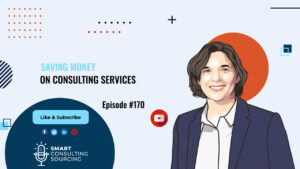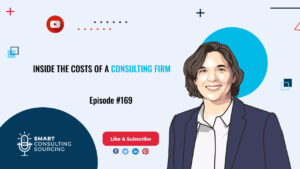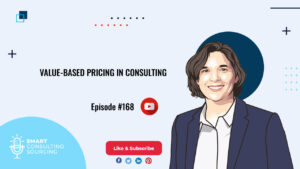Hi everyone, and welcome back to the sixth episode of your series: “How to buy consulting services like a pro.” Today I will tell you “What you should include in your RFP for consulting.”
But before that, let’s take a quick look at our previous episode that discussed “where to get started on an RFP for consulting?”
Before you start writing the perfect RFP, gather the right team, which should include project managers, project sponsors, key stakeholders, procurement leaders, and representatives of finance and strategy, if the project is significant or vital.
Role-wise, business lines are responsible for articulating the needs and desired results, and procurement is in charge of challenging and formalizing the requirements and making sure they adhere to policies and procedures.
Create an effective request for proposals (RFP) by making it clear, simple, realistic, and formalized. You should provide just the required information, state deadlines and expected outcomes, and use simple language. The goals you define should be attainable. And you can add a briefing stage when the project is complex.
Make sure you include enough details so that the consulting firms can comprehend the issues your organization faces as well as what you hope to achieve with the project. Keep an open mind to welcome innovative solutions to your problem.
Check out the Smart Consultancy Sourcing episode from last week! All of the usual suspects, such as Spotify, iTunes, and YouTube, have our podcasts available. The full transcript is accessible in the Thought Leadership part of our website consultingquest.com if you’d prefer to read rather than listen or watch.
Recipe of That Perfect RFP for Consulting
Get ready for an in-depth exploration that will equip you with all the essential know-how about drafting effective RFPs. Plus, along the way, we’ll provide you with some practical tips to make your journey even more successful.
Welcome to the competitive consulting world, where experienced professionals play a fast-paced game of RFPs, pitch decks, and board presentations. Here, success is determined in the blink of an eye! Just joking.
For the past few weeks, I have emphasized the importance of formalizing your needs into an RFP for consulting as well as having the right people and mindset. Today, I’m going to walk you through the necessary components that should be included in a Request for Proposal (RFP) when seeking consulting services.
One Vital Point to Remember While Defining Your Needs
We all know that consulting projects are only as successful as their clearly outlined requirements. It is easy for many organizations to let consultants define what work should be done, but this isn’t a smart decision.
Do you just rush out and buy the biggest bed in the store with all of its bells & whistles? What if you can’t sleep? Hence, it’s important to take into consideration every other potential solution before making such an investment.
Defining your needs with a consultant is similar. They will try to fit your problem into their talents and resources. To quote Abraham Maslow: “I suppose it is tempting, if the only tool you have is a hammer, to treat everything as if it were a nail.”
As You Take the Task Into Your Hands, What Should You Include In Your RFP?
Tackling this task on your own may feel daunting, but don’t worry–I’ve got you covered!
When crafting an RFP for potential consulting firms, make sure to include all the necessary information so that their proposal allows you to answer three questions.
First off: does this consulting firm understands what problem you’re trying to solve?
Then figure out if they have the skills required; do they know how best to tackle it?
And finally—will you work well together with them throughout the duration of our project? With that in mind, let’s take action and make it happen!
The First Element to Include in Your RFP Is the Background of Your Company
You may need to give more information about your company, business unit, or department and how it fits into the larger scheme if you are not very familiar with the Consulting Firms you wish to invite to the bid process. This strategy can help bring new competitors up to speed quickly. It is crucial for Consultants to understand the background of a company in order to identify similar projects and clients they have worked with before.
Next, You Need to Clarify the Context of Your Project.
Here, you should outline the primary goals and motivations behind initiating this Consulting Project.
As we discussed previously, it can be interesting to have a few meetings with Consulting Firms before releasing the RFP to hone your vision for the project. It’s not uncommon to learn, after beginning to describe your requirements, that you’re actually taking on a scope that’s too vast or that the project may be broken down into smaller portions.
Once the Context Is Established, You Can Move on to Specifying Your Project Requirements
The core of your RFP comprises: objectives, scope, and deliverables.
Consultants can be helpful in many ways, but very few will know what you need from them until you spell it out. The best place to begin is by restating the dilemma at the beginning of this section. Inform the consulting firms involved in the RFP process of the objectives and anticipated results.
The main objective can be stated in just a few simple sentences. Nonetheless, most paths, if not all, eventually end up at the Eternal City. The scope, the level of confidentiality, the people who should be involved on your end, and the schedule for the project may need some fine-tuning.
Finding the perfect equilibrium when outlining anticipated deliverables can be a difficult task. It’s easy to become overly detailed, which eliminates external providers’ expertise and creative potential in favor of temporary staff-like performance. This is not recommended practice; however, it can still succeed if you know precisely what needs to happen.
Our experience has highlighted the importance of allowing consultants to present their approach to problem-solving, instead of dictating a particular methodology. This will not only permit you the flexibility to make changes down the line – but also provide an alternative and potentially enlightening perspective in approaching challenging questions.
Next, Come the Schedule and Budget
You have a timetable in mind unless your project is not urgent. Or, at the very least, some internal deadlines and meetings. Consulting candidates must be aware of the project’s timeline. It has a direct impact on the team composition and project cost. Users and buyers almost never include a budget in the RFP.
However, if you are on a tight budget, it may make sense to include that information to avoid wasting time on proposals that you cannot afford. As a bonus, the consultants will be able to propose trade-offs or design-to-cost proposals.
Often Overlooked Details That Can Give You a Nasty Surprise Later
Now we are entering the murky depths of the consulting world. Here, we’ll find all those nitty-gritty details that are often overlooked or left out of an RFP for consulting. Prepare to be surprised, shocked, and amazed at what lies hidden beneath the surface!
Selection Process
To start, detail the selection process. Will there be a Q&A session and how will all responses be shared with everyone? When do you anticipate getting proposals back and when is the projected kick-off date for this project? How many rounds of review will it take to make your final decision? It is essential for prospective consultants to be aware of the key stages in this RFP process and how much time they will have to create and submit their proposals, as well as what resources they can allocate towards it.
Expected Outcomes
Both the criteria for selection and the expected outcomes of the proposal must be stated clearly. In theory, you are already aware of how you will go about making the cut. If not, now is the time to give it some thought. The competence of the firm to complete the task, the expertise of the firm, the transparency of the approach and the deliverables, the make-up of the team, the compatibility with your company, and the cost of the project are all typical selection criteria.
As you can see, there is a lot more to think about than just cost. Although there is no foolproof method for selecting the best Consulting Firms, it is essential to share your requirements with them early on so that you receive a high-quality proposal and can make well-informed equitable choices.
You should mention all of your needs in the RFP. For checking references, you could be interested in getting the names and contact details of past clients. Internal procurement policy can also incorporate eligibility requirements. It’s possible that your consultants need to be approved or qualified as vendors.
Primary Point of Contact
Finally, but not least, you must identify the primary point of contact throughout the process. Will it be a third party, an executive, or someone from procurement? During the RFP process, they should be the point of contact for all communications with Consulting Firms. Allowing Consulting Firms to make direct contact with Executives of their choosing would give incumbents an unfair advantage and distort competition.
A Quick Wrap-Up of Everything That Needs to Be Included in Your Proposal
You’ll notice that the first part of the RFP is mainly about the project and the expectations, business lines territory. While the end of the RFP is about process, compliance, and selection which is the procurement backyard. So again, and for the hundredth time maybe? Collaboration is key. This is the real secret to getting the best RFPs. Period. Now let’s conclude, shall we? Ready for your takeaways?
You are not making a purchase; rather, you are solving a problem. So, don’t focus on the means, but rather on the expected outcomes of the project. Because actually, you simply want the various candidates to submit their best proposal for your project.
Give some information about your company and the environment you operate in unless you work exclusively with consulting firms you already know. I’ll explain why this isn’t always a good idea to only work with familiar consultants another time.
Explain the assignment’s context. A project is almost never one-dimensional. Understanding a project’s political and technical implications is critical for designing a tailored solution to your problems.
Also, describe your goals in plain English. Put on paper the benefits and/or deliverables you anticipate from the project, as well as any constraints you may face.
And finally, be open and honest about the RFP process. Inform the Consultants about the RFP process, the content you expect in the proposal, and how you will make your decision.
Using the conventional “tough procurement guy” approach is so last year!
We’ll conclude our session for today here. We will delve deeper into clarifying your project’s context and background in the upcoming week. We’ll provide a few examples from real-life scenarios as well.
Till then, stay safe and happy sourcing and if you have any questions regarding today’s topic or any consulting procurement-related topic actually, feel free to contact us on LinkedIn or by email.
Bye and see you next week, au revoir.







